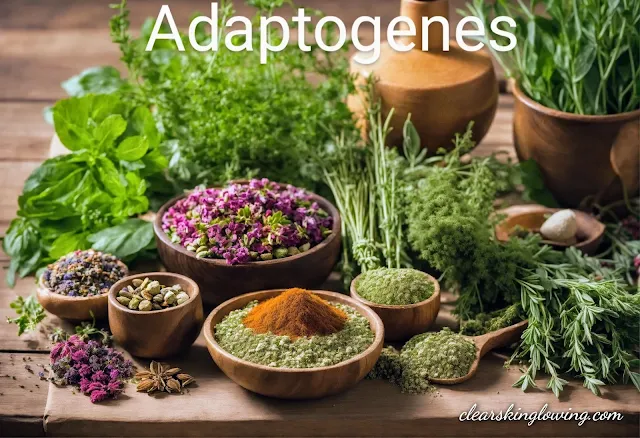Adaptogens in Skincare:
The Calm Before the Glow
Introduction
Adaptogens in skincare are like yoga for your face—calming, balancing, and surprisingly effective. These plant-derived wonders (think mushrooms and herbs) help your skin adapt to stress and get its zen on. Ready to find out why everyone’s jumping on the adaptogen bandwagon? Let’s dive in with some humor and, of course, the facts.
Benefits of Adaptogens
- Stress-Relief Superstars: They reduce the impact of environmental stressors, from pollution to harsh weather. Your skin stays calm, even when life isn’t.
- Moisture Masters: Adaptogens like ashwagandha and holy basil boost hydration levels, giving you that dewy, glass-skin glow.
- Barrier Boosters: Ingredients like chaga and reishi mushrooms strengthen your skin’s barrier, so it can keep the bad stuff out and the good stuff in.
- Anti-Aging Allies: Some adaptogens are loaded with antioxidants, combating fine lines and wrinkles like a pro.
Dos and Don’ts
Dos:
- Do introduce adaptogens gradually into your skincare routine.
- Do pair them with hydrating ingredients for a double-duty effect.
- Do look for certified organic adaptogen products to avoid unwanted chemicals.
Don’ts:
- Don’t mix too many active ingredients at once—your skin needs balance, not chaos.
- Don’t expect instant results; adaptogens work best with consistent use.
- Don’t neglect sun protection. Even adaptogens can’t fight UV damage solo.
Questions and Answers
Q1: What are adaptogens, exactly?
A1: They’re natural substances (like herbs and mushrooms) that help your body and skin adapt to stress. Think of them as Mother Nature’s chill pill.
Q2: Which adaptogens are best for the skin?
A2: Reishi and chaga mushrooms are hydrating and calming, while ashwagandha boosts elasticity and fights wrinkles.
Q3: Can adaptogens replace my moisturizer?
A3: Nope! They complement your skincare routine but don’t replace hydration basics.
Q4: Are adaptogen products safe for all skin types?
A4: Generally, yes. But patch-test new products to avoid surprises. (Nobody likes a red face unless it’s blush!)
Q5: How are adaptogens different from antioxidants?
A5: Adaptogens manage stress and balance your skin, while antioxidants focus on fighting free radicals. Together, they’re a dream team.
Q6: Can I DIY an adaptogen mask?
A6: Totally! Mix a spoonful of mushroom powder with yogurt or aloe vera for a quick, calming face mask.
Medical Disclaimer
This article is meant for informational purposes only. If you have sensitive skin or a known allergy to adaptogens, consult your dermatologist before using any new product. Also, adaptogens aren’t magic—they’re a supplement, not a substitute for a balanced lifestyle.
